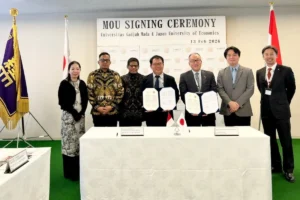Kishida, Cabinet ministers eat Fukushima fish to show it’s safe

Tokyo, The Gulf Observer: Japan’s Prime Minister Fumio Kishida and three Cabinet ministers ate Fukushima fish sashimi at a lunch meeting Wednesday, in an apparent effort to show that fish is safe following the release of treated radioactive wastewater from the Fukushima Daiichi nuclear power plant that began last week.
Kishida and the three ministers had sashimi of flounder, octopus and sea bass, caught off the Fukushima coast after the water release, along with vegetables, fruits and a bowl of rice that were harvested in the prefecture, Economy and Industry Minister Yasutoshi Nishimura, who was at the meeting, told reporters.
The release of the treated wastewater into the ocean, which began Thursday and is expected to continue for decades, has been strongly opposed by fishing groups and by neighboring countries. China immediately banned all imports of Japanese seafood in response. In South Korea, thousands of people joined rallies over the weekend to condemn the discharge.
All seawater and fish sampling data since the release have been way below set safety limits.
The lunch showed Kishida’s “strong commitment to take the leadership in tackling reputational damage while standing by the feelings of the fisheries community in Fukushima,” Nishimura said. “It is important to show safety based on scientific evidence and resolutely disseminate (the information) in and outside of Japan.”
Nishimura visited a Fukushima supermarket chain Monday to sample fish, and Kishida is set to visit Tokyo’s Toyosu fish market Thursday also to promote Fukushima fish.
In South Korea, President Yoon Suk Yeol also ate fish for lunch. According to Yonhap news agency, the Presidential Office cafeteria this week was serving Korean fish, whose demands have fallen due to concern about the impact of the release of the wastewater from the Fukushima plant.
Japan’s Foreign Ministry issued a travel advisory on Sunday urging Japanese citizens to use extra caution in China, citing an escalation of harassments and violent protests over the discharge of the wastewater. Chief Cabinet Secretary Hirokazu Matsuno said that stone throwers had targeted Japan’s embassy, consulates and schools in China.
“It is extremely regrettable, and we are concerned,” Matsuno said.
He also hinted at a possibility of taking the case to the World Trade Organization. He said that Japan has in the past raised issues under the WTO framework concerning China’s trade restrictions without scientific bases, and that “Japan will consider various options while continuing to work within the WTO framework to decide necessary steps.”
Officials and reports say thousands of crank calls from China have targeted Fukushima government offices and the nuclear plant’s operator. Many of the callers shouted in Chinese, and some yelled “stupid” and other swear words, Japan’s NHK public television said.
In Tokyo, a sign at a Japanese-style bar warning “the Chinese” that it’s only serving food from Fukushima caught the attention of a Chinese V-tuber, who called police complaining about the “nationality discrimination” against the Chinese by singling them out. The owner changed the sign but refused to talk.
Treated radioactive wastewater has accumulated since the March 2011 meltdown at the nuclear plant caused by a massive earthquake and tsunami. It totals 1.34 million tons and is stored in about 1,000 tanks. Japan’s government and Tokyo Electric Power Company Holdings say the water held in tanks is taking up much of the plant area and must be removed to free up space to build facilities for the plant’s cleanup and decommissioning, which are also expected to take decades.
In Japan, the release of the water has faced fierce opposition from fishing groups that fear it will further hurt the reputation of seafood from the Fukushima area. The groups are still striving to repair the damage to their businesses caused by the meltdowns of three reactors.


